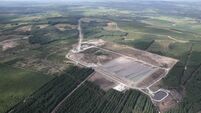We need a national conversation to plan for the country’s future
No big deal, although it involved endless amounts of blood disappearing into little tubes, and at one point a blood pressure cuff being attached to my arm for 24 hours.
I passed, you’ll be delighted to know (I hope). And when it was all over, I asked the doctor did all this mean I’d live to be 100? “Listen,” he said, “the medical test hasn’t been invented that can tell you that. If you want to live to a decent old age, the most important thing to do is to be very careful in your choice of parents.”















